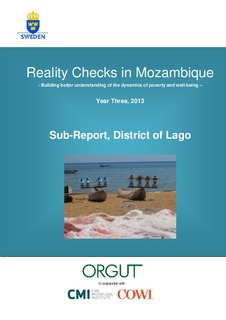Reality Checks in Mozambique. Sub-Report Lago. Year Three
Research report
Permanent lenke
http://hdl.handle.net/11250/2474864Utgivelsesdato
2013-12-01Metadata
Vis full innførselSamlinger
- Publications [1488]
Originalversjon
Stockholm/Maputo: Sida/Swedish Embassy MaputoSammendrag
A series of five “Reality Checks” will take place in the period 2011-2015, focussing on the dynamics of poverty and well-being with a particular focus on good governance, agriculture and infrastructure that are key sectors in Swedish development cooperation with Mozambique. Each Reality Check will be published in the form of one Annual Report and three Sub-Reports from each of the three selected study-sites (see ORGUT 2011a for more details). More concretely, the “Reality Checks in Mozambique” are expected to: Inform the public discussion among key development actors on poverty reduction, especially in the province of Niassa; Contribute to a better understanding of qualitative poverty monitoring methods in Mozambique; Provide Sweden with relevant qualitative data on developments and results from its engagement in Mozambique and support further implementation of its programme in Niassa. The series of studies was initiated by an Inception Report published in August 2011 (ORGUT 2011a). Through that exercise, it was decided that the Reality Checks shall be based on fieldwork in three different Districts/Municipalities in the Province of Niassa that display variations in terms of geographical locations, access to public services and levels of poverty and well-being. The three areas selected were i); the Municipality of Cuamba; ii) the District of Lago and iii) the District of Majune (see Map 1). The 1st Reality Check was carried out in 2011 in the form of three sub-reports (ORGUT 2011 b, c, d) and the first Annual Report (ORGUT 2011 e), and represent a baseline upon which the subsequent Reality Checks will build. Much of the background information given in the first set of reports will not be repeated, and being familiar with the base-line studies will therefore ease readings of the subsequent reports. The second set of reports was produced in 2012 with a thematic focus on governance (ORGUT 2012a-d). This is the sub-report on Lago for th
